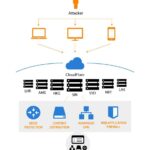On the balmy morning of September 17, 2024, the virtual landscape was rocked by an unexpected disturbance in the digital universe. Cloudflare, a prominent internet security company, found itself at the center of a mysterious incident that left millions of online users puzzled and concerned. As the cyber world buzzed with speculation and theories, the truth behind this enigmatic event slowly began to unravel, shedding light on the vulnerabilities and complexities of our interconnected online existence. Let us delve deeper into the Cloudflare incident of September 17, 2024, and explore the repercussions of this unforeseen disruption.
Table of Contents
- Overview of the Cloudflare Outage
- Causes Behind the September 17 Incident
- Implications for Cloudflare Customers
- Recommendations for Preventing Future Incidents
- Q&A
- In Conclusion

Overview of the Cloudflare Outage
On September 17, 2024, Cloudflare experienced a significant outage that affected a large number of websites and online services. The outage was caused by a technical issue within Cloudflare’s network infrastructure, which led to interruptions in the delivery of content to users. As a result, many websites using Cloudflare services were inaccessible or experienced slow loading times during the outage.
The outage lasted for several hours before Cloudflare was able to fully restore service to all affected websites. During this time, Cloudflare’s engineering team worked tirelessly to identify and resolve the underlying cause of the outage. While the incident was disruptive for many users and website owners, Cloudflare has since implemented measures to prevent similar outages in the future, ensuring greater stability and reliability for its customers.

Causes Behind the September 17 Incident
On September 17, 2024, Cloudflare experienced a major incident that disrupted services for many users. The incident was caused by a combination of factors that led to a series of cascading failures. One of the primary causes behind the incident was a misconfiguration in the network infrastructure, which resulted in traffic being improperly routed and overloaded certain systems.
Additionally, a software bug in one of the critical components of Cloudflare’s platform contributed to the incident. This bug caused system instability and ultimately led to a domino effect, impacting multiple services. The lack of adequate monitoring and alerting mechanisms also played a role in exacerbating the incident, as the issue went undetected for an extended period of time. Moving forward, Cloudflare is implementing stricter controls and enhanced monitoring to prevent similar incidents from occurring in the future.

Implications for Cloudflare Customers
For Cloudflare customers who were affected by the incident on September 17, 2024, there are several important implications to consider:
- Data Loss: Some customers may experience data loss as a result of the incident. It is recommended to review backups and restore any lost data if necessary.
- Downtime: Websites and services may have experienced downtime during the incident. Customers should monitor their website performance and address any lingering issues promptly.
- Communication: Keep customers informed about the incident and any steps being taken to prevent future disruptions. Transparency is key in maintaining trust and confidence.
| Status | Implication |
|---|---|
| Down | Customers may have experienced downtime during the incident. |
| Up | Normal operations have resumed for unaffected customers. |

Recommendations for Preventing Future Incidents
In order to prevent future incidents similar to the Cloudflare outage on September 17, 2024, it is imperative for organizations to implement robust backup and redundancy systems. Having backups in place can help mitigate the impact of unexpected outages and ensure business continuity. Additionally, regularly testing these backup systems is crucial to ensure they are functioning properly when needed.
Furthermore, investing in advanced monitoring and alerting tools can help organizations detect issues before they escalate into full-blown outages. Proactive monitoring can provide valuable insights into potential vulnerabilities and allow for quick remediation. Lastly, conducting regular security audits and updates to ensure all systems are up to date with the latest security patches is essential for maintaining a secure and stable infrastructure.
Q&A
Q: What happened during the Cloudflare incident on September 17, 2024?
A: On September 17, 2024, Cloudflare experienced a major incident that caused disruption to a number of websites and services relying on their network.
Q: How did the incident affect users and businesses?
A: The incident led to widespread outages, leaving users unable to access various websites and services. Businesses that relied on Cloudflare’s network experienced disruptions to their operations and services.
Q: What caused the Cloudflare incident on September 17, 2024?
A: The exact cause of the incident has not been disclosed by Cloudflare, but it was likely due to a technical issue or server malfunction within their network.
Q: How did Cloudflare respond to the incident?
A: Cloudflare promptly began investigating the issue and working to restore services as quickly as possible. They provided regular updates to users and businesses affected by the outage.
Q: What measures has Cloudflare taken to prevent future incidents?
A: Following the incident, Cloudflare has implemented additional safeguards and monitoring systems to help prevent similar outages in the future. They have also conducted thorough reviews of their network infrastructure to identify and address any potential vulnerabilities.
In Conclusion
the Cloudflare incident on September 17, 2024 serves as a reminder of the delicate nature of our interconnected digital world. Despite the temporary disruptions and frustrations caused by such incidents, they also offer the opportunity to reflect on the importance of robust cybersecurity measures and contingency plans. As we navigate the evolving landscape of technology, let us remain vigilant and resilient in the face of unforeseen challenges. Thank you for reading.










